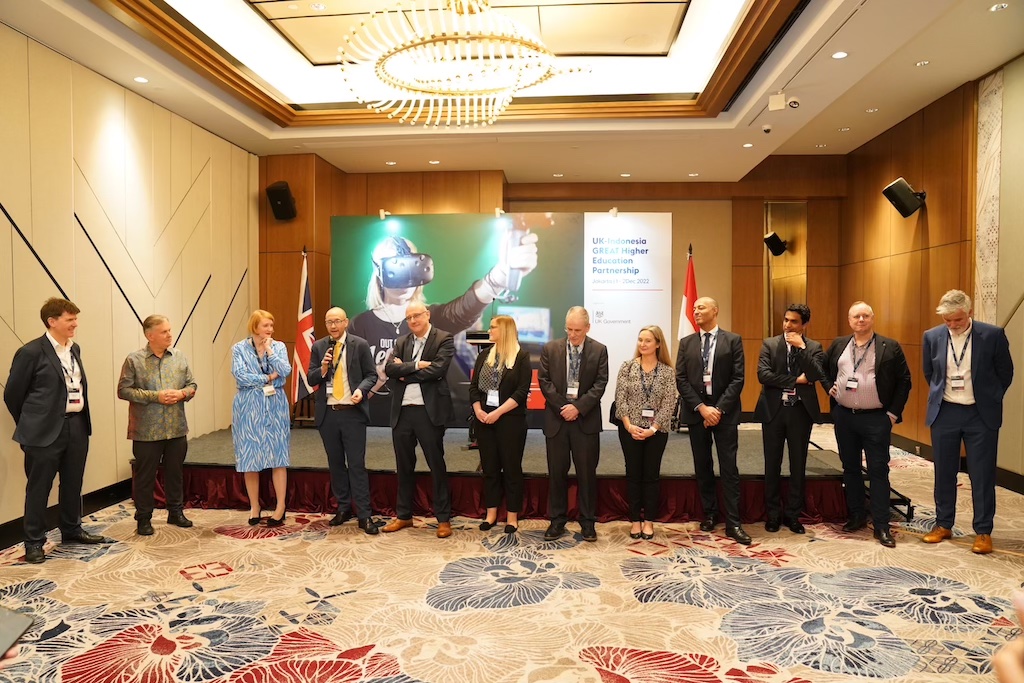UK universities to move into Indonesia
UK universities have established plans to move into Indonesia, following a higher education mission led by the government’s international education champion Steve Smith.
Representatives from 13 UK universities visited Jakarta at the end of November to meet with Indonesian academic institutions and discuss future collaborations and transnational education partnerships.
Smith also met Indonesia’s economics minister to discuss the set up of branch campuses in four of the country’s Special Economics Zones – regions which offer tax breaks, among other incentives, to attract foreign investment.
During the trip, the University of Dundee signed an agreement with the Indonesia International Institute for Life Sciences to begin delivering dual degrees, through which students will spend two years at each institution.

Photo: UK DIT
It has not been revealed which other universities will establish programs in Indonesia following the trip, but a “key investor” will visit the UK in January to meet with a potential partner university. There are also plans for a higher education forum and cooperation between the two countries on teacher training, technical education and English language teaching.
“I am delighted to finally visit Indonesia and meet our key partners”
The UK government named Indonesia as a “priority” country in its international education strategy, describing it as one of five regions where there is “significant potential for growth” and where Smith can “open up opportunities and address barriers to that potential”.
In recent years, the Indonesian government has outlined plans to establish TNE courses in the country, including setting out guidelines for the creation of international branch campuses.
The UK currently has 16 TNE partnerships in Indonesia and over 900 Indonesian students were taking UK TNE courses in 2020/21.
The trip also aimed to strengthen existing research partnerships, such as the UK-Indonesia Consortium for Interdisciplinary Sciences.
“I am delighted to finally visit Indonesia and meet our key partners, strengthening our bilateral education relationship and foster collaboration in higher education and transnational education,” Smith said. “I am also thrilled to be joined by 13 leading UK universities… I look forward to working closely with my Indonesian counterparts to support these to grow, in line with Indonesia’s ambitions to strengthen the higher education sector.”
Summer Xia, country director of British Council Indonesia & South East Asia lead, said, “Encouraging students and education institutions to build links, share ideas and good practice through transnational collaboration is an important part of our work at the British Council here in Indonesia, aimed at strengthening trust and mutually beneficial partnerships between our two countries.”
The visit was arranged by the British Council and the British Embassy Jakarta.
The post UK universities to move into Indonesia appeared first on The PIE News.




 Speed matters, but what agents really value is a relationship with universities
Speed matters, but what agents really value is a relationship with universities While these averages appear to be reasonable timeframes given the level of demand for the UK, just under 9% of agents considered their experience a fast service.
While these averages appear to be reasonable timeframes given the level of demand for the UK, just under 9% of agents considered their experience a fast service. The survey generated lots of comments about improving timely admissions decisions such as “speed up the offer and give a quick ‘no’ when admission is not possible”, “expedite the admissions and CAS process” and a need for “faster fairer processes”.
The survey generated lots of comments about improving timely admissions decisions such as “speed up the offer and give a quick ‘no’ when admission is not possible”, “expedite the admissions and CAS process” and a need for “faster fairer processes”.


 Working with third parties to access university contracts was a common feature with a 70% commission share being the common rate (43.1%). The reason for doing this was clear – 82.1% said they worked with third parties because they were unable to secure contracts directly with universities themselves.
Working with third parties to access university contracts was a common feature with a 70% commission share being the common rate (43.1%). The reason for doing this was clear – 82.1% said they worked with third parties because they were unable to secure contracts directly with universities themselves.


